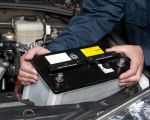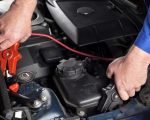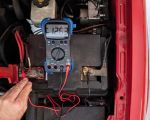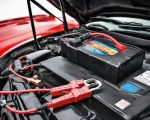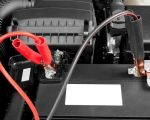How Do I Charge a Jump Starter? A Complete Guide to Charging and Maintaining Your Jump Starter
We’ve all been there: your car won’t start, and you’re in a hurry. Whether it’s the dead of winter or the middle of a busy day, a flat battery can ruin your plans in an instant. That’s where a jump starter comes in handy—especially when you don’t have another car around to jump-start your vehicle. However, for a jump starter to be effective, it needs to be charged and maintained properly. I’ve had my share of jump starter experiences, and today, I’ll walk you through everything you need to know about how to charge a jump starter, maintain it, and avoid common mistakes that can reduce its lifespan.

Firestone Complete Auto Care
1933 N Placentia Ave, Fullerton, CA 92831, USA
1. What Is a Jump Starter and Why You Need One
A jump starter is a portable device designed to provide a quick power boost to your car’s dead battery. I’ve found jump starters to be invaluable, especially during those times when I found myself stranded in parking lots or on the side of the road. They’re compact, easy to store, and can often jump-start your vehicle within minutes, without needing another car’s help.
Most modern jump starters are equipped with lithium-ion or lead-acid batteries and come with various features such as built-in flashlights, USB ports for charging devices, and even air compressors for inflating tires. But before you can rely on your jump starter in an emergency, it’s essential to ensure it’s fully charged and maintained.

Complete Auto Service of Ann Arbor
2890 Jackson Ave, Ann Arbor, MI 48103, USA
2. The Basics of Charging Your Jump Starter
Charging a jump starter is relatively simple, but understanding the process and doing it correctly is important. Here’s a breakdown of how I charge my jump starter and what I’ve learned over the years:
2.1 Understanding the Power Source
Most jump starters come with an AC wall charger that you can plug into any standard outlet to recharge the device. In addition, some more advanced models come with a car charger or USB charging option. I’ve used both methods, and while the wall charger is generally faster, the car charger can be handy if you’re on the go or need a recharge while traveling.
2.2 Check the Battery Level Indicator
Before charging, always check the battery level indicator on your jump starter. This will show you how much charge is left. Many jump starters have a simple “battery” light or digital display that will let you know if it’s time to recharge. I once neglected to check the charge on my jump starter, and it ended up being low when I needed it most. Lesson learned!
2.3 Plugging It In
Once you’ve confirmed that the jump starter needs charging, plug it into the power outlet using the provided charging cable. Most jump starters take anywhere from 3 to 8 hours to fully charge, depending on the capacity of the battery. I usually let mine charge overnight to ensure that it's fully ready for the next use. While charging, I make sure to place the device in a well-ventilated area, as some jump starters can get warm during the charging process.
2.4 Indicator Lights and Charging Time
While charging, keep an eye on the indicator lights. Many jump starters have an LED that turns green when fully charged, and some even have an automatic shut-off feature to prevent overcharging. I learned early on that overcharging can damage the battery, so it’s always good practice to unplug the device once it reaches full charge.
3. Common Mistakes to Avoid When Charging Your Jump Starter
While charging a jump starter is a straightforward task, there are a few mistakes I’ve made over the years that I’d recommend avoiding to ensure your jump starter lasts as long as possible:
3.1 Leaving It Plugged In Too Long
One mistake I’ve made in the past is leaving my jump starter plugged in for too long. While most modern devices have an automatic shut-off feature, it’s still a good idea to unplug it once fully charged to prevent any unnecessary wear on the battery. Overcharging can reduce its overall lifespan, so I always unplug it once the charging is complete.
3.2 Not Charging It Regularly
Jump starters are meant to be ready when you need them most, but if you don’t charge it regularly, it may not have enough power when you’re in an emergency. I’ve learned that charging my jump starter at least once every 1-2 months, even if I haven’t used it, keeps it at optimal power. A jump starter can lose its charge over time, and you don’t want to find out that it’s dead when you’re stuck on the side of the road.
3.3 Charging in Extreme Temperatures
Another important lesson I’ve learned is that extreme temperatures can damage both the jump starter and the battery. I’ve made the mistake of leaving my jump starter in a hot car, which can cause the battery to overheat and degrade. I always store it in a cool, dry place, and if I need to charge it during cold weather, I make sure to warm it up first to avoid any battery issues.
4. How to Maintain Your Jump Starter for Longevity
Proper maintenance is key to ensuring that your jump starter is always ready when you need it. Here’s how I’ve kept my jump starter in top shape:
4.1 Regularly Check for Damage
It’s always a good idea to check your jump starter for any signs of physical damage. I’ve had to replace mine once due to a cracked casing that exposed some of the internal wiring. Inspect the casing, connectors, and cables for any signs of wear and tear. If you notice any issues, address them before they cause bigger problems down the road.
4.2 Store in a Safe, Dry Place
Storage is another factor that can extend the life of your jump starter. I store mine in the trunk of my car in a protective case to keep it safe from moisture, dust, and extreme temperatures. I also make sure the jump starter isn’t exposed to direct sunlight for extended periods. Proper storage ensures the battery stays healthy and doesn’t experience unnecessary stress.
4.3 Use It Occasionally
One thing I’ve learned from experience is that a jump starter needs to be used every once in a while to keep the battery in good condition. I make sure to use mine every few months, even if I don’t need to jump-start my car. This helps maintain the battery’s ability to hold a charge and ensures that the jump starter is working properly when it’s needed.
5. When to Replace Your Jump Starter
Like all rechargeable devices, jump starters have a finite lifespan. If you notice that your jump starter is taking longer to charge or doesn’t hold a charge as well as it used to, it may be time to replace the battery. In my case, I had to replace mine after about 3 years of regular use, as the battery no longer held a full charge. Replacing the jump starter battery can be expensive, so it’s often easier and more cost-effective to replace the entire unit if it’s past its prime.
If you're looking for a high-quality jump starter that can be relied upon in emergencies, I highly recommend checking out Rescue & Towing for their excellent range of battery solutions. Not only do they offer great products, but their customer service is always there to help you with any questions regarding jump starters and other emergency equipment.














